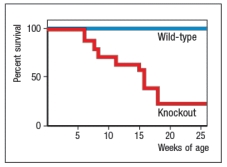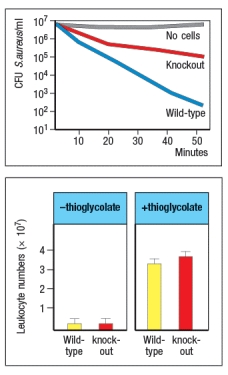Multiple Choice
A mouse model of an immunodeficiency disease affecting the innate immune response was generated by knocking out a single gene. Studies of these mice, performed in the 1990s, showed that they were highly susceptible to infections of pyogenic bacteria, such as Staphylococcus and Lactobacillus species, and to infections of fungal pathogens, such as Paecilomyces. In fact, without deliberately infecting the mice, the researchers performing these studies found that the knockout mice were spontaneously succumbing to these infections while housed in their vivarium (animal facility) , as shown in Figure. 
To determine the potential mechanism leading to the immune deficiency, a series of additional studies were performed. In one study, peripheral blood leukocytes from the mice were mixed with Staphylococcus aureus bacteria, and the ability of the cells to kill the bacteria was assessed. In a second study, the compound thioglycolate was injected into the peritoneal cavity of the mice, and five hours later the numbers of white blood cells were measured. This compound elicits a robust inflammatory response in the peritoneum, including the production of several inflammatory cytokines, such as TNFα, IL-1, and IL-6, as well as a number of chemokines known to recruit neutrophils and monocytes from the blood to the site of inflammation. The results of these studies are shown in Figure . 
Given these data, a likely candidate for the gene that was targeted in these knockout mice is:
A) IRAK4
B) CD18, the integrin chain
C) TLR3
D) G6PC3, the glucose-6-phosphatase catalytic subunit 3
E) p47, a component of NADPH oxidase
Correct Answer:

Verified
Correct Answer:
Verified
Q33: A variety of genetic defects can result
Q34: Bone marrow transplantation is currently used to
Q35: One important feature of retroviruses such as
Q36: Infants with RS-SCID generally require treatment by
Q37: The first drug treatment for HIV licensed
Q38: Common variable immunodeficiency (CVID) is a rather
Q40: Listeria monocytogenes is a Gram-positive facultative
Q41: Human genome-wide genetic association (GWAS) studies have
Q42: Defects in components of the complement pathway
Q43: A common misconception is that our immune